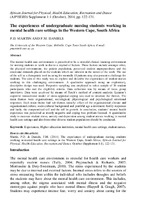The experiences of undergraduate nursing students working in mental health care settings in the Western Cape, South Africa
Abstract
The mental health care environment is perceived to be a stressful clinical learning environment for nursing students to work in due to a myriad of factors. These factors include amongst other, the physical environment, the patient population, perceived student unpreparedness and the emotional demands placed on the students which are inherent in the nature of the work. The use of the self as a therapeutic tool in caring for mentally ill patients may also present a challenge for students. The aim of this study was to explore and describe the experiences of student nurses working in this challenging environment. A qualitative approach using an exploratory, descriptive design was used. Purposive sampling was employed to select sample of 36 student participants who met the eligibility criteria. Data collection was by means of focus group interviews. Data were analysed by means of Tesch’s method of content analysis. Lazarus’s cognitive transactional model of stress-appraisal-coping was used to structure the themes. The main themes were organisational, sociological, physiological and psychological emotional responses. Each main theme had sub-themes namely: effect of the organisational climate and organisational culture; socio-cultural background and youthful age a detriment; bodily responses and lastly, the compromised self and the self in growth. In conclusion, students’ mental health experience was perceived as mostly negative and coping was problem-focused. A quantitative study to measure student stress, anxiety and depression among student nurses working in mental health care settings and also from other diverse student populations should be conducted.

